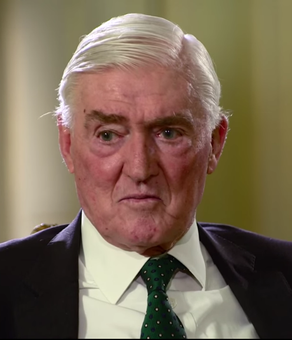
Parkinsonism is a clinical syndrome characterized by tremor, bradykinesia, rigidity, and postural instability. These are the four motor symptoms found in Parkinson's disease (PD), after which it is named, dementia with Lewy bodies (DLB), Parkinson's disease dementia (PDD), and many other conditions. This set of symptoms occurs in a wide range of conditions and may have many causes, including neurodegenerative conditions, drugs, toxins, metabolic diseases, and neurological conditions other than PD.

Michael Andrew Fox, known professionally as Michael J. Fox, is a Canadian-American retired actor. Beginning his career in the 1970s, he rose to prominence portraying Alex P. Keaton on the NBC sitcom Family Ties (1982–1989). Fox is famous for his role as protagonist Marty McFly in the Back to the Future film trilogy (1985–1990), a critical and commercial success. He went on to headline several films throughout the 1980s and 90s, including Teen Wolf (1985), The Secret of My Success (1987), Casualties of War (1989), Doc Hollywood (1991), and The Frighteners (1996). Fox returned to television on the ABC sitcom Spin City in the lead role of Mike Flaherty from 1996 to 2000.

Dementia with Lewy bodies (DLB) is a type of dementia characterized by changes in sleep, behavior, cognition, movement, and regulation of automatic bodily functions. Memory loss is not always an early symptom. The disease worsens over time and is usually diagnosed when cognitive impairment interferes with normal daily functioning. Together with Parkinson's disease dementia, DLB is one of the two Lewy body dementias. It is a common form of dementia, but the prevalence is not known accurately and many diagnoses are missed. The disease was first described by Kenji Kosaka in 1976.
Lewy body dementias are two similar and common subtypes of dementia—dementia with Lewy bodies (DLB) and Parkinson's disease dementia (PDD). Both are characterized by changes in thinking, movement, behavior, and mood. The two conditions have similar features and may have similar causes, and are believed to belong on a spectrum of Lewy body disease that includes Parkinson's disease. As of 2014, they were more often misdiagnosed than any other common dementia.

Cecil Edward Parkinson, Baron Parkinson, was a British Conservative Party politician and cabinet minister. A chartered accountant by training, he entered Parliament in November 1970, and was appointed a minister in Margaret Thatcher's first government in May 1979. He successfully managed the Conservative Party's 1983 election campaign, and was rewarded with an appointment as Secretary of State for Trade and Industry, but was forced to resign after revelations that his former secretary, Sara Keays, was pregnant with his child, whom she later bore and named Flora Keays. Flora was born with severe cerebral palsy.

James Parkinson was an English surgeon, apothecary, geologist, palaeontologist and political activist. He is best known for his 1817 work An Essay on the Shaking Palsy, in which he was the first to describe "paralysis agitans", a condition that would later be renamed Parkinson's disease by Jean-Martin Charcot.

Encephalitis lethargica is an atypical form of encephalitis. Also known as "sleeping sickness" or "sleepy sickness", it was first described in 1917 by neurologist Constantin von Economo and pathologist Jean-René Cruchet. The disease attacks the brain, leaving some victims in a statue-like condition, speechless and motionless. Between 1915 and 1926, an epidemic of encephalitis lethargica spread around the world. The exact number of people infected is unknown, but it is estimated that more than one million people contracted the disease during the epidemic, which directly caused more than 500,000 deaths. Most of those who survived never returned to their pre-morbid vigour.

Wolff–Parkinson–White syndrome (WPWS) is a disorder due to a specific type of problem with the electrical system of the heart. About 60% of people with the electrical problem developed symptoms, which may include an abnormally fast heartbeat, palpitations, shortness of breath, lightheadedness, or syncope. Rarely, cardiac arrest may occur. The most common type of irregular heartbeat that occurs is known as paroxysmal supraventricular tachycardia.

l-DOPA, also known as levodopa and l-3,4-dihydroxyphenylalanine, is an amino acid that is made and used as part of the normal biology of some plants and animals, including humans. Humans, as well as a portion of the other animals that utilize l-DOPA, make it via biosynthesis from the amino acid l-tyrosine. l-DOPA is the precursor to the neurotransmitters dopamine, norepinephrine (noradrenaline), and epinephrine (adrenaline), which are collectively known as catecholamines. Furthermore, l-DOPA itself mediates neurotrophic factor release by the brain and CNS. l-DOPA can be manufactured and in its pure form is sold as a psychoactive drug with the INN levodopa; trade names include Sinemet, Pharmacopa, Atamet, and Stalevo. As a drug, it is used in the clinical treatment of Parkinson's disease and dopamine-responsive dystonia.

Ropinirole, sold under the brand name Requip among others, is a medication used to treat Parkinson's disease (PD) and restless legs syndrome (RLS). In PD the dose needs to be adjusted to the effect and treatment should not be suddenly stopped. It is taken by mouth.

Katherine Jane Parkinson is an English actress. She appeared in Channel 4's The IT Crowd comedy series as Jen Barber, for which she received a British Comedy Best TV Actress Award in 2009 and 2014, and was nominated twice for the BAFTA Television Award for Best Female Comedy Performance, winning in 2014. Parkinson studied at the London Academy of Music and Dramatic Art, and has appeared on stage in the plays The Seagull (2007), Cock (2009), and Home, I'm Darling (2018), for which she was nominated for the Olivier Award for Best Actress in a Play.

Philip John Parkinson is an English professional football manager and former player who played as a midfielder. He is currently manager of National League side Wrexham.
Sir Michael Parkinson is an English broadcaster, journalist and author. He presented his television talk show Parkinson from 1971 to 1982 and from 1998 to 2007, as well as other talk shows and programmes both in the UK and internationally. He has also worked in radio. He has been described by The Guardian as "the great British talkshow host".

Rasagiline is an irreversible inhibitor of monoamine oxidase-B used as a monotherapy to treat symptoms in early Parkinson's disease or as an adjunct therapy in more advanced cases.
Li, Xuening; Gao, Zixuan; Yu, Huasen; Gu, Yan; Yang, Guang (2022). "Effect of Long-term Exercise Therapy on Motor Symptoms in Parkinson Disease Patients: A Systematic Review and Meta-analysis of Randomized Controlled Trials". American Journal of Physical Medicine & Rehabilitation. 101 (10): 905–912. doi:10.1097/PHM.0000000000002052. PMID 35695530. S2CID 252225251 – via Ovid.

Dihydroergocryptine (DHEC), sold under the brand names Almirid and Cripar among others, is a dopamine agonist of the ergoline group that is used as an antiparkinson agent in the treatment of Parkinson's disease. It is taken by mouth.

Parkinson's disease (PD), or simply Parkinson's, is a long-term degenerative disorder of the central nervous system that mainly affects the motor system. The symptoms usually emerge slowly, and as the disease worsens, non-motor symptoms become more common. The most obvious early symptoms are tremor, rigidity, slowness of movement, and difficulty with walking. Cognitive and behavioral problems may also occur with depression, anxiety, and apathy occurring in many people with PD. Parkinson's disease dementia becomes common in the advanced stages of the disease. Those with Parkinson's can also have problems with their sleep and sensory systems. The motor symptoms of the disease result from the death of cells in the substantia nigra, a region of the midbrain, leading to a dopamine deficit. The cause of this cell death is poorly understood, but involves the build-up of misfolded proteins into Lewy bodies in the neurons. Collectively, the main motor symptoms are also known as parkinsonism or a parkinsonian syndrome.

Pimavanserin , sold under the brand name Nuplazid, is an atypical antipsychotic which is approved for the treatment of Parkinson's disease psychosis and is also being studied for the treatment of Alzheimer’s disease psychosis, schizophrenia, agitation, and major depressive disorder. Unlike other antipsychotics, pimavanserin is not a dopamine receptor antagonist.

Befiradol is an experimental drug being studied for the treatment of levodopa-induced dyskinesia. It is a potent and selective 5-HT1A receptor full agonist.

Parkinson's law is the adage that "work expands so as to fill the time available for its completion." It is sometimes applied to the growth of bureaucracy in an organization, but can be applicable to all forms of work.

















